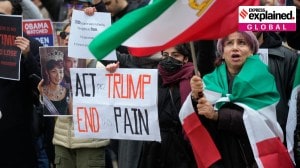Kickback where it hurts
If you travel to Mumbai often you also must have struggled to find a hotel room there. Tariffs have gone right to the top of what the hospit...

If you travel to Mumbai often you also must have struggled to find a hotel room there. Tariffs have gone right to the top of what the hospitality industry calls rack rates. Discounts are a thing of the past which is fair enough, given the fact that it is a cyclical industry. What you grudge is how our entirely ridiculous politics is contributing to today8217;s scarcity.
If you pay top-dollar to stay at suburban Mumbai8217;s JW Mariott hotel, please walk just a hundred metres ahead to see a very large, locked and non-functional five-star property which could have easily added another thousand rooms to hotel-starved Mumbai, creating jobs, generating taxes and profits and, not the least importantly, loan repayments for some hapless banks. But would our political system allow such a reasonable thing to happen? This is the Juhu Centaur, the centre-piece of such Left anger over Arun Shourie8217;s disinvestment days. Alright, under pressure from the Left his government has most reluctantly ordered a CBI inquiry into the sale of the hotel formerly owned by Air India to Ajit Kerkar. But while the inquiry goes on, why must it remain a dead white elephant even as the new buyer8217;s interest liabilities to his lenders mount? Whatever be his 8220;crime8221; and whatever the inquiry might eventually reveal, how is any purpose served by keeping the hotel shut just when Mumbai enjoys its biggest hotel boom of all times?
Land is already in very short supply and even if a plot was to be found a five-star hotel of this size will take many years to build. This one can be up and running in months. Scams and inquiries are not unique to Indian politics. But in a more civilised system, while investigations go on there would have been no need to keep the business shut, or to prevent the new buyer from re-selling the property. A very easy way could have been found by seeking indemnities and bank guarantees from either Kerkar or his new buyer. But would the political class ever allow that?
This is a peculiarly Indian practice of demonising a deal in a manner that benefits no one but causes enormous national loss. It does not contribute in any way to punishing the culprit, if any, or recovering any money lost. But just the noise scares everybody in the system into washing his hands off the whole thing. The standing waste of Juhu Centaur, one of the best located hotels in Mumbai, is only one of the more stark examples of this self-destructive politics that all our parties indulge in.
The trend was initiated by V.P. Singh and the BJP during the Rajiv Gandhi prime ministership with Bofors, HDW submarine and Airbus. While nearly 15 years of expensive investigations into the Airbus 320 deal yielded nothing, the very whiff of scandal intimidated the political leadership into grounding the newly acquired aircraft for nearly two years. It is to this remarkable stupidity that Indian Airlines partly owes its chronic losses. While there may have been questions on the price paid, what purpose was served by demonising the aircraft and grounding it while Indian Airlines8217; and thereby the tax-payer8217;s interest costs mounted? While Indian Airlines has never recovered from that setback, this self-inflicted atrocity imposed no punishment on the suppliers or any middlemen. Once the CBI closed the file, there was need, in fact, for an inquiry into who forced the grounding of such a valuable and expensive national asset and thereby caused the taxpayer so much loss.
The case of the Bofors gun has been even more ridiculous. While all kinds of inquiries have gone on, where was the need to give the gun a bad name, to junk plans to manufacture it in India, to stop importing spares and ammunition, when a large number of pieces had already been bought off the shelf? You have a situation today where Bofors, proven so spectacularly effective in Kargil and subsequently in the fire-assaults across the LoC following 13/12, is short on spares and ammunition and every now and then we send scouts out to the arms underworld to buy ammunition at blackmarket prices. The numbers of the guns have remained static and even now we are looking at another gun in the same category to modernise our remaining artillery regiments. Once again, as with Centaur and the Airbus, there was no fault with the gun. So while investigations went on into kick-backs what purpose was served by giving the gun a bad name, not even allowing the regiments already equipped with it to fully stock up on spares and ammunition? As with Centaur now and the Airbus then, our political class was more interested in making political capital rather than catching any guilty. So it suited them to malign the gun, to spread canards in election campaigns that it8217;s been firing backwards killing our own troops and so on. Ask some Pakistani military analyst what tipped the balance in Kargil and they will tell you it was Bofors. And yet if that skirmish 8212; a mere skirmish, not a full-fledged war 8212; had gone on for two more weeks, the same guns would have been short of ammunition and spares just because we had black-balled its manufacturers and suppliers.
Nobody in the ministry of defence, for two decades now, has had the courage to rectify this and the army8217;s finest weapon and force multiplier is rapidly threatening to become an albatross around its neck. The absurdity is of course topped by the fact that while we boycotted the Swedish manufacturer a state owned PSU! we have named one of the more important roads in New Delhi after Olof Palme, who, as Swedish prime minister, is supposed to have helped swing this deal. The German HDW submarine bought in the same period 8212;and the centrepiece of another scandal 8212; nearly met the same fate and even that programme never really fully developed for the navy.
The Congress is now retaliating in kind with similar kind of scandal-mongering on another artillery gun system, the South African Denel. Again, the gun is fine, is badly needed, supplies are were? in the pipeline and considerable work has already gone on a factory to assemble it in India. The factory happens to be located in Nalanda in Bihar predictably, former defence minister George Fernandes8217;s constituency and Nitish Kumar made an appeal to the Centre just this week to salvage the project. Chances are, he will have no such luck. Denel is Congress8217;s answer to Bofors. It can always turn around and ask Nitish and George who made the rules in this cynical game? They will ask this even more loudly as the clamour over Quattrocchi8217;s accounts increases.
The time has now come for our political leaders to revise this approach. Our politics is only becoming more fragmented and contentious. Governments change more often and coalition politics means today8217;s allies are tomorrow8217;s adversaries and vice versa. In such a bitter environment, almost anything can be the subject of another scam. So, would our political class agree to change that old script, by consensus, to not block or destroy a project or an acquisition even while endless inquiries into alleged kickbacks go on? One look at the standing waste of Juhu Centaur in a hotel-starved Mumbai would tell them why the need to do so is so urgent.
Write to sgexpressindia.com
- 01
- 02
- 03
- 04
- 05































